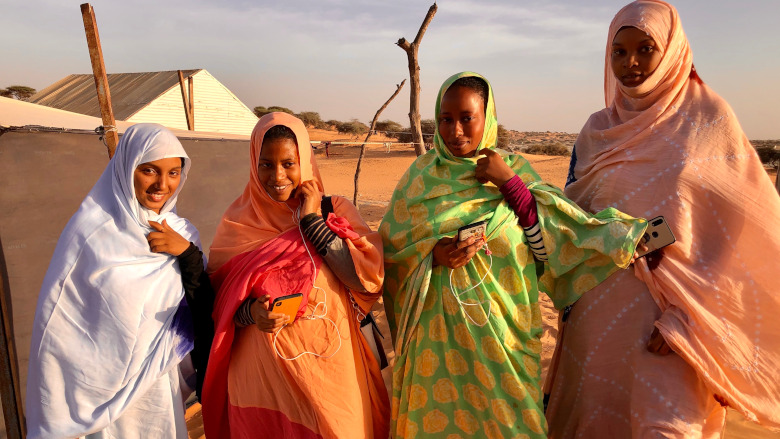NOUAKCHOTT, MAURITANIA, September 21, 2020—Their multicolored long veils contrast with the monochromatic dunes and bushes surrounding the tent where the women of the village of Bouteydouma sit. Their faces show their satisfaction and their broad smiles reflect their pride in having accomplished something significant. One by one, Fatimetou Mint Mohamed unrolls the hides that have just come from their tannery: “We used to spend all day drinking tea; now we are busy and contributing to the household finances.”
Although they have always done some rudimentary tanning for their own personal use, things changed a year and a half ago when Fatimetou and four other women from this village in southwestern Mauritania attended training at the Technical and Vocational Training Institute in Boghé, more than 200 km away. In this region, where the main occupation is raising livestock, “We realized that no one saved the hides of slaughtered animals. They had no value and were thrown away,” says Fatimetou, who today is the head of the Bouteydouma Women’s Association.

Receiving full room and board for two months with other women from all parts of Mauritania, some of whom brought along their babies, Fatimetou and fellow trainees learned a less noxious, more environmentally friendly technique to tan hides. Their teacher Hassan also showed them how to make new items, like special gourds that keep water cool.
“We have stayed in contact with him on WhatsApp and he helps us when we have questions,” says Fatimetou. They also benefited from a management course and equipment and funds to purchase hides and some working capital to launch their business.
Choosing a trade and training for it
Training courses and financial assistance like the women of Bouteydoum received are being deployed in six countries of the Sahel—Burkina Faso, Chad, Mali, Mauritania, Niger and Senegal—under the Regional Sahel Pastoralism Support Project (PRAPS). It is transforming the lives of many rural households whose main source of income is livestock. For years they have faced climate, security, and population challenges that have made them increasingly vulnerable. The situation is precarious for many more, so it is essential to diversify their incomes to preserve and improve their way of life.
“We first conducted surveys of households so they could identify the activities that they would like to develop and the skills needed to take up those activities,” explains Doussou Hamzata Dicko, who is responsible for gender and social mediation for PRAPS. “The project targets young people and women in particular and supports them until they begin to produce high-quality products and become independent.”

Leather and hide tanning, animal fattening operations, milk processing, and the manufacture of milk products are all income-generating activities that are rooted in the pastoral world but also respond to collective needs, like plumbing and electricity or the processing of agri-food products.
The project, which is being implemented by the Ministries of Livestock and Employment and Professional Training, has received $248 million in financing from the World Bank through the International Development Association and is coordinated by the Permanent Inter-State Committee for Drought Control in the Sahel (CILSS). PRAPS directly supports more than 2 million people in six countries through parallel activities that aim to protect natural resources, promote animal health, and facilitate the marketing of livestock. It has provided 517 skills training courses for people living in rural areas and has provided equipment and seed capital to more than 20,000 individuals, 88% of whom are women.




